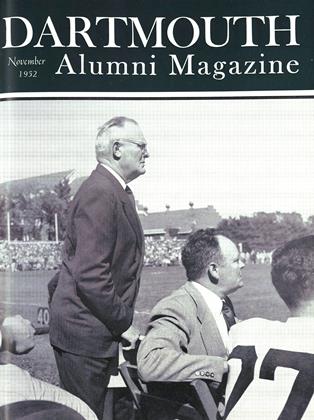NATHANIEL L. GOODRICH has written a factual but nostalgic book called The Waterville Valley, about an area in east central New Hampshire surrounded by several lesser peaks: Tecumseh, Osceola, Tripyramid, and Sandwich. The book has been nicely printed by Roderick Stinehour '50 at the North Country Press, Lunenburg, Vermont. This is the first book by this press, and the first issue I have been told is only 350 copies. Thus the book should appeal to collectors of books about New Hampshire, as well as those who collect press books. There are illustrations and map endpapers.
Mr. Stinehour was a Dartmouth pupil of Ray Nash, and I am willing to predict a fine career for him as printer. Order, if you want a copy, from the North Country Press. The price is only $8.50, which must mean a loss on each copy.
I also recommend to your attention, in this year of grace, 19521 Learned Hand s admirable book of collected papers and addresses: The Spirit of Liberty (Knopf). In this age of chicanery, dishonesty, and phony patriotism, too often used as a mask to cover up nefarious practices by many of our politicians, it is indeed refreshing to read the words of an honest and wise judge, the finest, I think, in this country, though he never got on the Supreme Court. The book contains his famous speech delivered in 1944 on "I Am an American Day" at Central Park, New York City. It is worth the price of the book.
My son, a new Dartmouth freshman, is now taking an astronomy course, and recommended to me a fascinating book he had read last summer, The Nature of theUniverse by Fred Hoyle. His last chapter, "A Personal View," carries on where Bertrand Russell's A Free Man's Worship leaves off. He writes about a difficult subject with great clarity, and his point of view may shock the orthodox. Some critic said of this: "Nothing so daring in this field since Jeans and Eddington."
William O. Douglas is one who loves to travel. He also has the perspicacity to realize that in any country where the wealth is in the hands of the few, and where the poor are very, very poor, as in Spain and Panama, Iran and Egypt, then those countries are ripe for revolution. Revolutions generally come from the rottenness of the right, rather than from the strength of the left. His appeal is that we should understand and try to alleviate the misery of the have-nots, and not support the rotten regimes which have for centuries exploited their people and left them an easy prey to communism.
His latest book. Beyond the Himalayas, tells of a trip made in 1951 to Afghanistan, Pakistan, and India. Mr. Douglas started in Afghanistan, crossed the deserts beyond the Khyber Pass, and then continued into the western approaches of the Himalayas. He had read the late Frank Smyth's TheValley of Flowers, and so he collected many botanical specimens for the Smithsonian. He also made transcriptions of Kulu and Kahuli love songs. This is all very well, but what interested me the most were his factual reports of his discussions with the local leaders about the serious menace of communism. His plan to defeat this disease makes a good deal of sense, At least he has taken great trouble to find the facts for himself, and his findings should interest the armchair strategists who read Colonel McCosmic. Unfortunately many of these estimable gentlemen wouldn't be found dead with his book. This is a pity, for Mr. Douglas has a lot of intelligent things to say. The book is illustrated with Mr. Douglas's own photographs, many in color.
To all and sundry, but especially to those who love horses, Indians, Southwest history (especially Texas history), I recommend a book by that old master of the trail and pen, J. Frank Dobie, a story teller and historian supreme, who brings to everything he writes a simple candor, a fresh approach, a rugged honesty and a forthrightness that is refreshing. His new book The Mustangs covers such subjects as Indian horses and horsemanship, the Comanches, Arabian horses, cow ponies, and much lore about the "wild and free" horses, the mustangs.
After-dinner speakers will get tome- thing of value from Bennett Cerf's GoodFor a Laugh (Hanover House). Here you will find such quips as Woolcott's crack about Los Angeles: "Seven suburbs in search of a city," and W. C. Fields' remark when he was asked if he ever suffered delirium tremens in Hollywood: "It's impossible to tell where D.T.'s end and Hollywood begins."
HATS FOR '56 take place of the beanie. Not all were tossed fire-wards during the Holy Cross rally.
 View Full Issue
View Full Issue
More From This Issue
-
 Article
ArticleOn Educational Policy
November 1952 By PROF. ANTON A. RAVEN -
 Article
ArticleThe Business of Being a Gentleman
November 1952 -
 Class Notes
Class Notes1918
November 1952 By ERNEST H. EARLEY, DONALD L. BARR -
 Class Notes
Class Notes1929
November 1952 By F. WILLIAM ANDRES, EDWIN C. CHINLUND -
 Article
Article"The Greatest Sport"
November 1952 -
 Class Notes
Class Notes1921
November 1952 By REGINALD B. MINER, ROBERT M. MACDONALD
HERBERT F. WEST '22
-
 Article
ArticleTAXI? CALL JOHN CASSIN '94
May 1940 By Herbert F. West '22 -
 Article
ArticleHanover Browsing
October 1949 By HERBERT F. WEST '22 -
 Books
BooksCHICAGO: THE SECOND CITY
July 1952 By Herbert F. West '22 -
 Article
ArticleHanover Browsing
March 1953 By HERBERT F. WEST '22 -
 Article
ArticleHanover Browsing
November 1954 By HERBERT F. WEST '22 -
 Article
ArticleHanover Browsing
April 1957 By HERBERT F. WEST '22







